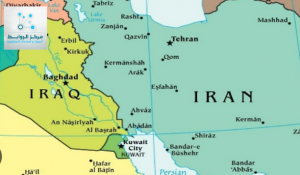
By: Shatha Kalel
Iran announced a significant increase in exports to neighboring Iraq in the first quarter of the Iranian year, which begins on March 21. According to senior Iranian trade official Farzad Beltan, Iran’s exports to Iraq rose by more than 27% year-on-year in the quarter ending June 20, reaching nearly $3 billion. This announcement underscores the deepening economic ties between the two nations and highlights Iran’s strategic focus on bolstering its regional trade relationships amid ongoing international sanctions and economic challenges.
Historical Context
The relationship between Iran and Iraq has been marked by a complex history of conflict and cooperation. Following the devastating Iran-Iraq War (1980-1988), the two countries have gradually rebuilt their relationship, with economic collaboration becoming a cornerstone of their bilateral ties. The overthrow of Saddam Hussein in 2003 and the subsequent establishment of a new government in Iraq opened a new chapter in Iran-Iraq relations, allowing for greater economic and political engagement.
In recent years, Iran has emerged as one of Iraq’s most significant trading partners. This economic partnership is mutually beneficial: Iraq relies on Iranian goods to meet its domestic needs, while Iran views Iraq as a critical market for its exports, especially in light of sanctions that limit its trade with many other countries.
Analysis of Recent Trade Figures
The latest figures show a substantial increase in the volume and value of Iranian exports to Iraq. Iran exported nearly $3 billion worth of goods to Iraq in the first quarter of its current fiscal year, marking a 27% increase compared to the same period in the previous year. This growth can be attributed to several factors:
Strategic Economic Policies: Iran has strategically focused on expanding its trade with neighboring countries to mitigate the impact of international sanctions. Iraq, sharing a long border with Iran, is a natural partner in this endeavor.
Diversified Export Portfolio: Iran’s exports to Iraq include a wide range of goods. Natural gas represents the largest portion, with $1.21 billion worth of gas supplied via pipelines in the three months until late June. Additionally, steel shipments reached $223 million, while major agricultural food product exports rose to nearly $215 million. This diversification helps stabilize trade flows and reduces dependency on a single commodity.
Infrastructure and Logistics: The development of infrastructure and logistical networks has facilitated smoother trade between the two countries. Enhanced transportation links and streamlined customs procedures have made it easier for Iranian goods to enter the Iraqi market.
Import Figures and Bilateral Trade Balance
In contrast to its robust export performance, Iran’s imports from Iraq during the June quarter amounted to $107 million, a 25% increase compared to the same period in 2023. While this is a notable increase, the trade balance remains heavily in Iran’s favor. This trade imbalance reflects the different economic structures and production capacities of the two countries. Iraq’s economy, heavily reliant on oil exports, has limited diversification, whereas Iran produces a wide array of goods for export.
Implications for the Future
The significant increase in Iran’s exports to Iraq has several implications:
Economic Resilience: The growth in exports demonstrates Iran’s resilience in the face of economic sanctions. By strengthening regional trade ties, Iran can mitigate some of the economic pressures imposed by international restrictions.
Regional Influence: Economic ties often translate into political influence. By deepening its economic relationship with Iraq, Iran can enhance its political leverage in the region. This is particularly important given the complex geopolitical dynamics in the Middle East.
Domestic Economic Benefits: Increased exports contribute to domestic economic stability by supporting Iranian industries and creating jobs. This is crucial for a country facing significant economic challenges.
Conclusion
Iran’s announcement of a significant increase in exports to Iraq highlights the importance of regional trade partnerships in its economic strategy. The historical context of Iran-Iraq relations, combined with recent trade figures, underscores the deepening economic interdependence between the two countries. As Iran continues to navigate international sanctions and economic challenges, its growing trade with Iraq represents a vital lifeline and a strategic priority. This trend is likely to continue, with further implications for the economic and political landscape of the region.
Economic Studies Unit / North America Office
Rawabet Center for Research and Strategic Studies
